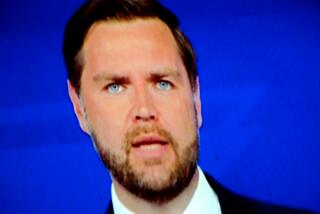COMMENTARY : Our Critic Looks at Debate as Theater
- Share via
When you find yourself checking your watch to see how many more minutes this thing has to go, it’s not good theater.
Your reviewer caught himself consulting the old Timex more than once Thursday night at Pauley Pavilion. The recent vice-presidential debate had drama. The second meeting between George Bush and Michael Dukakis did not.
Is that what presidential debates are supposed to provide: drama? In a sense, yes.
Not fireworks, necessarily. A presidential debate could be thoroughly courteous, yet keep the viewer on the edge of his chair.
Imagine the candidates saying exactly what they thought about an issue, in words that both illuminated the issue and that set their positions clearly apart.
The effect would be that of a good Shaw play: the exhilaration of clear thought cutting through the fog layer.
Dramatic? You bet. But risky. Nobody knows what’s above the fog layer, and nobody knows how the public would react if the two candidates tried to reach that high.
So our candidates were clearly counseled to keep things general, to push the right patriotic buttons, to come off like a real guy and, above all, to not screw up.
In acting terms, none of these is a strong enough “intention” to provide a gripping performance. That’s why Thursday’s debate seemed so namby-pamby, whether you saw it live or at home.
Two callers to a radio show immediately after the debate accused both Bush and Dukakis of “play acting.” True, but that goes with standing up before an audience. Lincoln and Douglas were also play acting.
The question is, where did the actor study?
Dukakis appeared to have done his residency at General Hospital. The concerned eyes. The meaningful pauses. “I’m sorry, Christine, but we’ve got no . . . choice. I’m afraid we’re going to have to . . . operate.”
Bush seemed to have been watching reruns of a 1950s sitcom that might have been called “Father Knows Worst.” “Bud, have you seen my car keys? Gee, whiz, can’t any of you kids ever put anything back ? Oh, here they are.”
Benign modes--neither of these guys is going to turn into Mussolini on us--but not very elevating ones. Vocally, Dukakis projects a slight subtext of impatience, as if all this communicating were getting on his nerves. Bush’s subtext, not so slight, is about being misunderstood--why pick on me?
Each man’s body language suggests a cliche. Dukakis’ choppy gestures say that he plays things “close to the vest.” Bush is more loosely strung, more “open-handed.”
That doesn’t always play well on TV. The replays of Thursday night’s debate made Bush look more herky-jerky than he did when you saw him live at Pauley. Bush wasn’t without grace on the podium, and the camera didn’t catch the moment when he stilled some derisive laughter from the GOP side of the auditorium (the bride’s side) so that Dukakis could finish a point.
On the other hand, one moment played better on the home screen than it did in the hall: Bush’s pretending to be scandalized when CNN’s Bernard Shaw asked what would happen if he, Bush, died between Election Day and Inauguration Day.
“Why, Bernie!” As if to say: Is that anything to bring up at the dinner table? A delicious piece of self-satire . . . I think.
The home audience probably didn’t realize that most of Pauley was empty, the audience area being limited to a portion of the floor. That probably contributed to the coolness of the event, as compared with the Bentsen-Quayle set-to.
Another effect that didn’t register on the home screen: Each candidate cast two shadows on the back wall. What was the intended symbolism here?
More to Read
The biggest entertainment stories
Get our big stories about Hollywood, film, television, music, arts, culture and more right in your inbox as soon as they publish.
You may occasionally receive promotional content from the Los Angeles Times.










